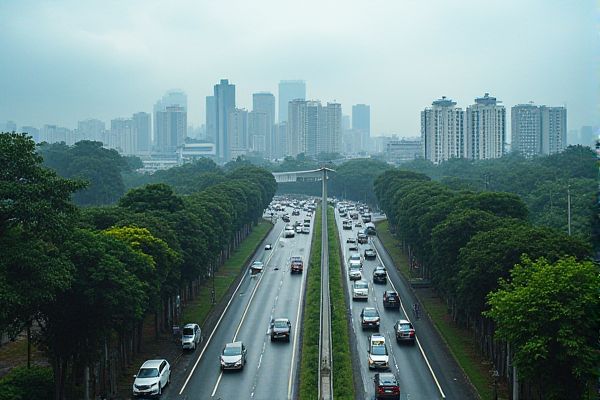
What to know as new resident in Indonesia: Language: Indonesian (Bahasa Indonesia). Currency: Indonesian Rupiah (IDR). Climate: Tropical and humid. Culture: Diverse and multicultural. Religion: Majority Muslim. Food: Spicy and flavorful. Transportation: Traffic congestion common. Electricity: 220V, type C/F plugs. Healthcare: Private and public options. Etiquette: Respect local customs.
Language: Indonesian (Bahasa Indonesia)
To navigate Indonesia as a new resident, it's crucial to learn basic Bahasa Indonesia, including greetings like "Selamat pagi" (good morning) and "Apa kabar?" (how are you?), introductions, and useful phrases such as "Berapa harganya?" (how much does it cost?) and "Terima kasih" (thank you). Understanding numbers, directions, and basic interactions will significantly enhance your experience and interactions with locals. For more details on essential phrases, visit Ocean Earth Travels to equip yourself with language skills for a seamless journey.
Currency: Indonesian Rupiah (IDR)
The Indonesian Rupiah (IDR) serves as the official currency of Indonesia, divided into 100 sen, despite sen no longer being in circulation due to high inflation. Banknotes are available in denominations ranging from 1,000 to 100,000 IDR, and coins come in values from 50 to 1,000 IDR. To minimize costs, it is advisable to use the mid-market exchange rate and avoid exchanging currency at airports or hotels.
Climate: Tropical and humid
Indonesia enjoys a tropical climate marked by high humidity levels ranging from 70% to 90% and fairly consistent temperatures across different areas. Coastal regions generally experience averages around 28°C, while inland areas maintain a typical 26°C, and the higher mountain regions are cooler at 23°C. The country's climate is primarily divided into two major seasons: a dry season spanning from April to October and a wet season lasting from November to March. However, Visit Indonesia explains that these seasonal patterns are becoming less predictable as a result of global warming, impacting the traditional weather expectations in the region.
Culture: Diverse and multicultural
Indonesia is a multicultural society with over 17,000 islands, more than 255 million inhabitants, and over 1,128 ethnic groups, each with unique customs, languages, and traditions. The country's motto, "Unity in Diversity," reflects its harmonious coexistence of diverse cultures, emphasizing collective living and inclusiveness.
Religion: Majority Muslim
In Indonesia, approximately 87.06% of the population identifies as Muslim, predominantly Sunni Muslims of the Shafi'i school of jurisprudence. Despite the significant Muslim majority, Indonesia is a secular state that officially recognizes six religions, including Islam, Christianity, Hinduism, Buddhism, Confucianism, and others, promoting religious pluralism and tolerance.
Food: Spicy and flavorful
Indonesian cuisine is characterized by the five flavor S's: spiced, spicy, sweet, sour, and strong, with a heavy emphasis on spicy and hot flavors, particularly through the use of sambals and complex spice blends like "bumbu." Regional variations include dishes like Rendang from Sumatra, Gado Gado from Java, and the widespread use of coconut milk and rice. For an insightful exploration of these flavors, the Global Cuisine Series offers a deep dive into these culinary experiences that showcase the vibrant tastes of Indonesia.
Transportation: Traffic congestion common
As a new resident in Indonesia, particularly in Jakarta, be aware that the city ranks 30th worldwide for worst traffic congestion, with average travel times of 23 minutes for 10 kilometers and an average maximum speed of 21 kilometers per hour, largely influenced by numerous development projects and [high vehicle density](https://en.tempo.co/read/1821626/jakarta-ranks-30th-as-city-with-worst-traffic-congestion-worldwide).
Electricity: 220V, type C/F plugs
In Indonesia, the standard electricity specifications are 230V at a frequency of 50Hz, and the country uses Type C and Type F power plugs and sockets. You will need a power plug adapter if your devices use different types of plugs, and a voltage converter if your devices are not compatible with the 230V standard. For more detailed information and guidance on using electrical devices in Indonesia, visit the Power Plugs and Sockets website.
Healthcare: Private and public options
In Indonesia, new residents should be aware that the healthcare system is a mix of private and public options, with public healthcare under the JKN program often lacking in quality and resources. In contrast, private hospitals and group practice clinics offer better facilities, modern equipment, and English-speaking staff, making them the preferred choice for expats despite higher costs. For more detailed information and guidance, visiting the website for International Insurance could be beneficial as it provides comprehensive insights into navigating healthcare in Indonesia.
Etiquette: Respect local customs
In Indonesia, it is important to respect local customs by greeting people formally with a handshake and the word "Selamat," while also using titles and last names. Dressing modestly, especially at religious sites, is essential to show respect. Additionally, it's crucial to avoid certain hand gestures and body language considered rude, such as using the left hand or showing the soles of your feet. For further insights into Indonesian customs and etiquette, visit the comprehensive Indonesia Guide on the Commisceo Global website.
